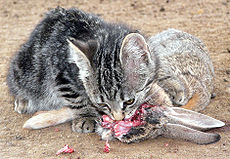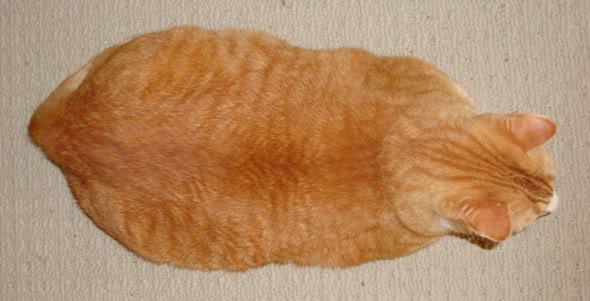Feeding FelinesCat Food Feeding your feline properly is the most important thing you can do to ensure your cat’s health, longevity, and well-being. Did you know cats are obligate carnivores? This means they must eat animal protein (not plant protein) to provide them with the essential amino acids vital to their survival. Their basic requirements are water, meat and fat from animal sources, minerals and vitamins. Carbohydrates can provide useable energy in small amounts. Cats are predisposed to numerous dietary-related health issues, such as Diabetes, Urinary Crystals, Inflammatory Bowel Disease (otherwise known as IBD), Obesity, Hepatic Lipidosis (or fatty liver disease), Dental Caries and Allergies. This propensity toward disease – many of them preventable - makes it even more crucial to know the type of food best for your cat. Basic Nutritional Requirements consist of water, protein, fat, minerals, vitamins, fiber, carbohydrates and greens. Water: Cats are actually descendents of desert dwelling felines. They inherently have a lowered drive for thirst, receiving most of their water requirement from the food they eat. Water is one of the most important essentials in your cat’s overall health. It is needed to maintain hydration and proper urinary function. A cat’s natural diet is prey (mice, birds and other small animals) which is made up of approximately 75% water. Protein: Protein is necessary to build muscle and repair tissues. The most complete source of protein is raw fresh meat. Animal protein provides all of the required amino acids including taurine and arginine which cats are unable to synthesize from plants. Taurine deficiencies in cats cause blindness and heart disease. Protein (not carbohydrate) is your cat’s main source of energy. Fat: This nutrient contains many of the fat-soluble vitamins such as A, D, E and K. Fat is important for healthy skin and coat. It also makes food taste better and tends to satisfy your cat’s hunger. Fat is another source of energy for felines. Minerals: Calcium and phosphorus are important minerals for building bones. Other minerals maintain healthy skin, ligaments, red-blood cells and the immune system. Most commercial cat food now comes supplemented with minerals recommended by the AAFCO. While supplements are beneficial, they are more bio-available in unprocessed meats. Vitamins: There are two types of vitamins, fat-soluble and water-soluble. Vitamins A, D, E, and K are fat-soluble and they are stored within your cat’s fatty tissues and liver. The body does not store water-soluble vitamins. They must be ingested daily. Vitamin C and the B complex are water-soluble. Vitamins are involved in many processes in the body and often work in conjunction with minerals and enzymes. Fiber: Fiber is a term used for indigestible carbohydrates. This includes cellulose, starch, pectin and gums (like guar gum). Although fiber is not essential to a cat's diet, a small amount is good for the colon and helps to prevent constipation. Some fiber will ferment in the digestive tract encouraging the growth of healthy intestinal flora. Carbohydrates: Cats require very few carbohydrates. A natural feline diet contains only 3-5% while commercial dry cat food is made up of 30-60% carbohydrates. Two reasons for this excessive carbohydrate content is that grains and potatoes produce starch, which is needed for kibble to keep its form. Additionally, grains are less expensive than meat. Greens: Greens, such as oat grass, are a natural part of a cat's diet. They minimize gas and aid digestion. Some cat food contains greens but you can easily grow your own. Most cats enjoy this. The Types of Cat Food Although a cat’s nutritional needs are rather unique, they are not particularly hard to satisfy if one sticks to meat. Many cat owners opt for the convenience of manufactured cat food. Because meat is an expensive ingredient, most commercial cat food products contain very little animal protein and lots of inexpensive plant protein, filler and grain. The following is a list of feeding options with the most nutritious being listed first and the least nutritious, last. Raw Diet: In nature cats eat their prey whole. They are naturally equipped with strong jaws and very sharp teeth designed for ripping and tearing meat, and crunching through the pliable raw bones of small animals. They also have very strong stomach acids, as well as very short digestive tracts that efficiently process raw Just a few of the benefits of feeding raw are 1) cleaner teeth and healthier gums, 2) increased digestibility of meals, 3) mental and physical stimulation and 4) smaller, less odiferous stools. While raw is really the way nature intended for cats to eat, ATG realizes many owners are not comfortable with this choice or find it impractical to prepare meals this way. If convenience is the issue, there are some excellent commercially prepared frozen raw foods available such as Blue Ridge Beef, Aunt Jeni’s and Primal. Even if your cat only eats raw occasionally, the benefits are enormous. *Cats should never be given cooked bones. Cooked bones can splinter and cause choking or perforate the intestine. For details on how to start your feline on raw, visit www.rawfedcats.org Canned or Pouched Food: This is the next best choice after a raw or home-prepared diet. Canned food provides nearly the same amount of water as cats obtain from prey. Look for high quality products containing animal meats (preferably human grade) and few carbohydrates. Be sure to avoid products with artificial preservatives such as BHA, BHT and ethoxyquin. Fortunately, these days there are plenty of excellent choices when it comes to canned food such as Nature's Variety Instinct, Wellness Healthy Indulgence (Grain Free), BFF and Felidae Grain Free. Grain-Free Dry Kibble: These products deserve to be in a class above ordinary dry cat food. When combined with a high quality canned food, grain free kibble can alleviate certain health conditions. We know cats that have had reversals from diabetes, food allergies and obesity-related conditions by simply removing grains from the diet. Grain also has the potential to be contaminated with mites and molds that can cause serious sickness or death. Dry Kibble: Feeding kitty a diet entirely of dry kibble is almost as far removed from a cat’s natural diet as one can get. Kibble only contains 10% water, which is not nearly adequate. Cats must drink a lot more water when only fed dry cat food and since they have a lower thirst drive, they often do not get enough. This leads to dehydration, decreased urinary frequency, crystal formation and blockages. Secondly, most dry kibble brands are excessively high in carbohydrates. They also contain grains and plant proteins such as potato protein, soy protein isolate, corn gluten, rice gluten and wheat gluten. Plant proteins boost protein levels on the guaranteed analysis without providing the full amino acid profile of meat. They can also be detrimental to your cat’s health. For example, soy protein has been implicated in hyperthyroidism. Vegetarian/Vegan Diet: This sort of diet is NOT in the best interest of the cat. Cats are carnivores; they must eat animal meat. Other Thoughts Free feeding is a practice that often leads to obesity. A high-quality kibble with few carbohydrates is less likely to cause this problem but generally cats do best on one to three measured servings per day. Rotating your cat’s protein source is essential. Feeding kitty the same food every day of his or her life contributes to allergies and digestive issues. Rotate between single-source novel proteins such as chicken, rabbit, duck, quail, fish and occasionally light red meats such as lamb or venison. Veterinary prescription diets as a general rule contain low quality ingredients, grains and by-products. Ask your vet what specific ingredient is or is not in the food he is prescribing that makes it beneficial for your cat. You may be able to simply add the needed supplement to the natural diet you are currently feeding without compromising overall nutritional quality. Against The Grain Pet Nutrition is a company that does things differently. We are a small business that is excited about offering pet owners better choices in pet nutrition. We believe that choosing appropriate pet food (be it commercial, raw or home prepared) is the most important factor in any pet's preventative health, convalescence and longevity. Our name - Against The Grain - reflects our strong passion to provide pet owners with the knowledge to make healthy decisions about pet care even if we go ‘against the grain' of popular thinking. 
 To contact us:
To contact us:www.ATGPetNutrition.com 1024 County Road 109 Montevallo, AL 35115 Phone: 205-665-9026 Fax: 205-665-5683 [email protected] Copyright © 2024 Against The Grain Pet Nutrition, LLC.
|




 meat and bone.
meat and bone. 